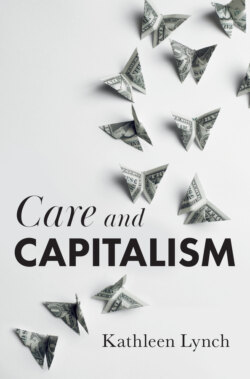Читать книгу Care and Capitalism - Kathleen Lynch - Страница 40
Being a Man
ОглавлениеWhat underpins White male control is a very particular concept of what it is to be a man, what it is to be masculine. Because we become what we live, the work that we do, and what and who we value while doing it, have a major impact on our character and who we become (Sayer 2009: 5). By practising the norms of competitive masculinity, it is inevitable that most men will absorb related capitalist values over time (Hartmann 1979: 21). By filling the places created by other powerful men, each new generation of men is engaged in enacting the practices and codes of hegemonic masculinity that make these posts what they are (Connell 2000). What happens in parallel with living out hegemonic, dominant-led masculinity is the denigration of the qualities associated with its opposite, namely social need and dependency. Despite the emergence of hybrid masculinities, and the selective incorporation of elements of identity associated with various marginalized and subordinated masculinities as well as femininities into hegemonic masculinities, the new hybrids do not signal the end of male dominance (Demetriou 2001; Messerschmidt 2010). Combining toughness with tenderness in a male public persona often masks the perpetuation of male systems of power and inequality (Messner 2007). Borrowing some ‘soft’ feminine symbols and practices may even conceal male power by giving it a symbolically acceptable face. Much research on hybrid masculine practices shows that they often work in ways that ‘fortify symbolic and social boundaries, perpetuating social hierarchies in new (and “softer”) ways’ (Bridges and Pascoe 2014: 255). The principle of dominance that is central to masculinity remains intact; it is defined against femininity and its perceived vulnerability and dependency. As it is men who carry capitalism’s torch, and define its parameters in elite positions, capitalism and hegemonic masculinity are deeply embedded with each other.
Independent of bureaucracies, capitalism produces moral dispositions of indifference to the interests of others, what Adorno (2005) termed ‘bourgeois coldness’ in the pursuit of one’s own interests. While upper-class women negotiate the services of cleaning, caring and catering for the family, upper-class men generally do not meet poor women in person, but only know them as the providers of abstract, invisibilized services as cleaners, caterers or childcare workers. These men are not confronted by the in-person feel of poverty. Even in average-income households, men do not manage the household harms of capitalism as much as women, especially where they are felt most keenly and cannot be ignored, namely in poor families (O’Neill 1992; Dodson 2010). The moral imperative to do hands-on caring does not apply to men as it does to women (Bubeck 1995; Glenn 2000; O’Brien 2007). Men are allowed to be ‘cold’, to be careless (in hands-on care terms), more than women.
While there are developments in Europe promoting a caring masculinity model to replace the hegemonic ideal of male dominance, especially in the academic field (Ruby and Scholz 2018), how and when that will translate into familial, organizational and state politics remains to be seen. Whatever the outcome, unless caring and hegemonic concepts of masculinity are better aligned, it is hard to see how a caring world order can be part of a new political imaginary.
To date, the overlap between the constituencies of capitalist and patriarchal interests, not just in maintaining the hegemony of men in heterosexual families, but in the developing of hegemonic constructs of competitive, controlling masculinity in employment and within the machinery of the state, means that capitalism and patriarchy are inextricably linked. And the same can be said of the relationship of capitalism and racism; the success of the capitalist project globally is not only deeply classed and gendered; it is also deeply racialized and tied to a long history of colonialism (Patel and Moore 2018).
